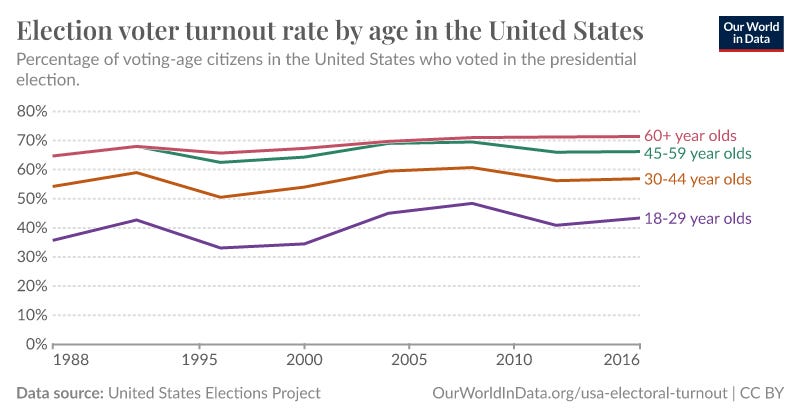Bye Bye Biden
The doomed-to-fail incumbent has hobbled his way off the pitch, what does that mean for the Presidency?
For weeks I’ve been confidently predicting that no one in America could beat Trump. His base is energized and he’s reaching more and more Americans, even archetypical Democrats like Mark Zuckerburg are calling him “badass”.
And he just seems to be indestructible. His mugshot appeared on his merch, becoming a symbol of his fight against the establishment rather than his, well, criminality. He once said he could shoot someone on fifth avenue and not lose voters: his stream of court cases, and their lack of impact on the polls, suggests he was probably right.
He’s not even just politically indestructible - a bullet literally whizzed past the guy, missing his brain by centimeters.
The debates clinched it for Trump. Americans spent ninety excruciating minutes watching a frail, elderly man lose a verbal duel with Trump, who seemed to have barely aged since his debates against Clinton eight years ago. Biden did not seem fit to be a librarian, let alone the leader of the free world. Democracy might not survive a Trump term, but it seemed like Biden himself wouldn’t have survived a Biden term.
It was pretty clear, from that moment on, that Biden would not be the next President. The Democrats would pull him out (or, he’d somehow stay on and lose against Trump).
As President, Trump stoked division, endorsed violence, encouraged attacks. He lied, and lied, and lied. But those are distant memories now. Today, he is a great speaker, who draws huge crowds, and keeps his policy positions vague (or unashamedly inconsistent) enough to appeal to a wide range of voters.
But most of all, Americans felt better off when Trump was President. They felt better off because they were better off. Since he’s left office, inflation has quadrupled (not at the fault of any politician, it’s happened globally post-pandemic and post-war).
As he left office, 61% of Americans said they were better off than they were three years ago. Voters will tolerate a lot if it leaves them feeling richer.
But does Biden’s departure change the arithmetic? When I first started drafting this, there were some doubts about who his replacement could be. But by the time you’re reading this it is beyond doubt: Kamala Harris has secured the nomination and will run against Trump, and I increasingly think she is a real contender.
She is like a Hillary Clinton Mark 2. Clinton was an undeniable establishment crony, juxtaposed against Trump’s anti-establishment, drain-the-swamp rhetoric. Harris is not. Harris is funny and she’s easy to connect with. Clinton was not. And, quite possibly above all, Clinton seemed the shoo-in. An underdog can mobilize their supporters to get out and vote, a seemingly clear winner cannot. This time around, Harris is the underdog (and a generation of voters still remember the shock of waking up in 2016 to a Trump presidency): people will leave their houses, queue at polling stations, and vote for her.
She also seems to have this real popularity with younger voters. (That’s a dangerous group to rely on, for as much as they insist they are politically engaged, young people’s voter turnout is consistently extremely low.)
If I was a betting man, my money would still be on Trump: but Harris is not to be underestimated. I wrote after the UK election that people don’t vote for divided parties: the Democrats have successfully united against her. We know, from January 6, that the Republican Party can turn quickly on Trump (though how quickly they forgive and forget). It’ll only take one misstep from him or his VP to become that divided party: and there’s mounting divisions between even the two of them.


